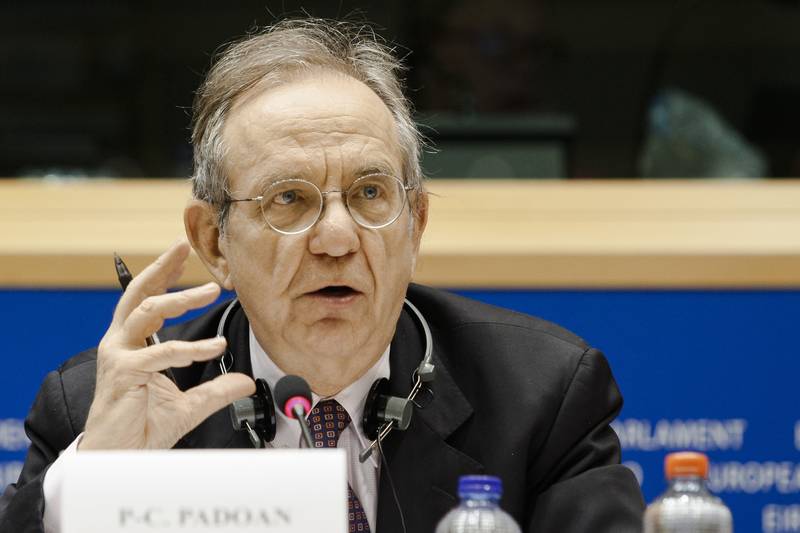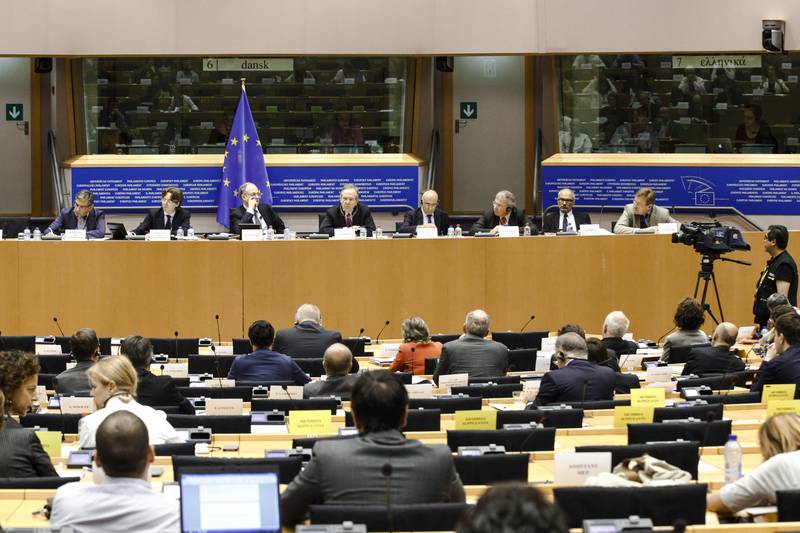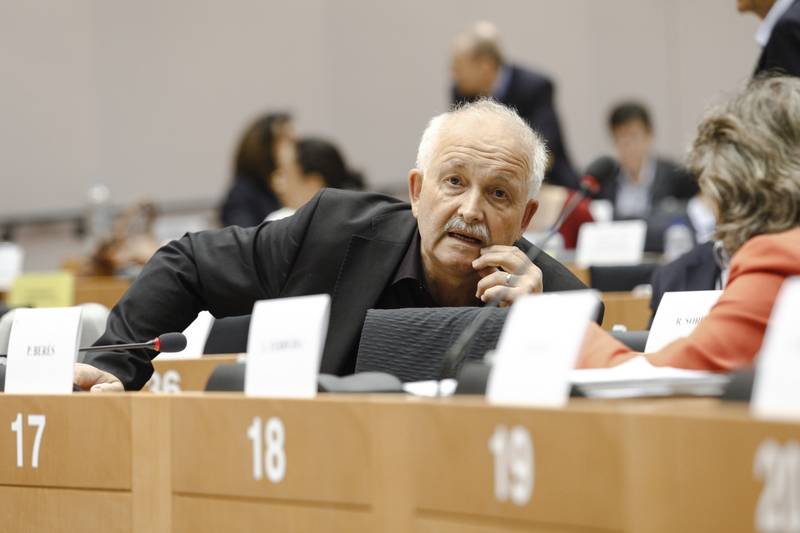Hard Landing of Hopes for Less Austerity
Adelina Marini, July 24, 2014
 Matteo Renzi and his Social Democrats have won the most convincing victory in the entire EU at the European elections in May with a promise for structural reforms and soothing the pains from austerity. The latter has created excessive expectations which the Italian prime minister fuelled with populism that the end is near to counting every penny and a new age is coming where belts will be loosened. Moreover, Matteo Renzi was viewed by analysts and media as a threat to Merkel's ascetic monopoly over the European economic policy, especially after he succeeded to insert a text in the June summit conclusions that talks about "more flexibility" when using the fiscal discipline rules. The passing of the text, though, was surrounded by a war of words between Rome and Berlin regarding the meaning of "flexibility" and how exactly will it be applied.
Matteo Renzi and his Social Democrats have won the most convincing victory in the entire EU at the European elections in May with a promise for structural reforms and soothing the pains from austerity. The latter has created excessive expectations which the Italian prime minister fuelled with populism that the end is near to counting every penny and a new age is coming where belts will be loosened. Moreover, Matteo Renzi was viewed by analysts and media as a threat to Merkel's ascetic monopoly over the European economic policy, especially after he succeeded to insert a text in the June summit conclusions that talks about "more flexibility" when using the fiscal discipline rules. The passing of the text, though, was surrounded by a war of words between Rome and Berlin regarding the meaning of "flexibility" and how exactly will it be applied.
Padoan is not Renzi
After the June 26-27 summit it became clear that no changes are envisaged in the existing documents that define fiscal discipline and that rules will be respected. What is this flexibility all about then? A question that was asked many times by MEPs in the European Parliament economic committee during the hearing of Italy's Finance Minister Pier Carlo Padoan who presented the priorities of the Italian presidency of the Council of the EU. This was the first appearance of the Italian finance minister before the newly constituted committee where the anti-system Five Star Movement (M5S) of Beppe Grillo has a solid presence. The M5S MEPs are now part of David Cameron's nightmare - Nigel Farage and his group of Europe of Freedom and Direct Democracy (EFDD). It is these MEPs as well as many from the group of Gabriele Zimmer's United Left that expressed disappointment that what Mr Padoan offers them has nothing to do with the messages Premier Renzi has been conveying.
Moreover, some MEPs said that Padoan, an academic, lacks that passion and dream that things are getting better Matteo Renzi has been radiating. Greek MEP from the United Left group Dimitrios Papadimoulis said directly that only 20 days ago the Italian prime minister created huge expectations. He [Renzi] said that the austerity policy has failed and now we should think about growth and job creation. Your speech today, however, was a "very sudden landing". Matteo Renzi's flying high goals are now landed because of the Merkel dogma, the left-wing MEP from Greece added. He entered the European Parliament through the Greek Coalition of Radical Left (SYRIZA).
On the other hand, the hard right group of the European Conservatives and Reformists (ECR), where a majority hold David Cameron's Conservatives, demanded an explanation of the trend to weaken the rules. Some countries are trying to make the budget deficits look smaller through shadow budgets, said one ECR member. A member of Grillo's movement, for his part, acknowledged he was completely confused and does not understand at all what is the thing with flexibility since it is already being applied. Spain and France have received an extension of the deadlines to correct their budget deficits. On the one hand, the new economic and financial affairs commissioner, Jyrki Katainen, says there is no room for manoeuvre but on the other, the Italian undersecretary for European affairs, Sandro Gozi, says right the opposite, the MEP complained.
Pier Carlo Padoan was persistent in trying to bring clarity by choosing to speak mainly in English. He firmly refused to compare himslef with his prime minister saying he would not dwell on the differences between Mr Renzi and a minister of finance. Mr Padoan is an academic. He was a professor of economics in the University of Rome and in the influential College of Europe in Bruges. He worked in the International Monetary Fund and was a consultant of the World Bank, the European Commission and ECB. He said he wanted to share his experience and knowledge both with the MEPs and with everyone in the EU because there is a lot to learn from the crisis and the way some member states in the Union but also outside handled it. He made a direct link between the European economic policy and the ECB's monetary policies, headed by an Italian too - Mario Draghi.
"Creative" accounting, as he called it, should be avoided because if there are serious intentions for structural reforms they should bear fruit. In the past weeks there is an intensive talk in the European public domain of Matteo Renzi's idea some types of spending aimed at boosting growth not to be taken into account when calculating the budget deficit. Padoan's philosophy is different and he underscored that he presents the Italian Presidency's agenda which has been approved by the Italian government, which means by Prime Minister Matteo Renzi as well. In it, the focus is on structural reforms. However, what is being offered is these reforms to be implemented nationally but in a very tight coordination at  European level and with a clear conscience that they will have positive or negative impact on neighbouring countries and the EU at large.
European level and with a clear conscience that they will have positive or negative impact on neighbouring countries and the EU at large.
The programme talks about "positive spillovers" and taking the maximum out of them to increase the common GDP instead of increasing the gaps between the member states. Reforms need to be broadly based and well balanced in terms of short-term benefits and long-term costs. They should be country-specific but with a thought of boosting the common economic growth. Every area that impedes growth should be reformed. In some countries that is the judiciary, in others the public administration, in third, like Italy, there is a need to reform the labour market. Practically, Padoan says directly that the member states need to comply in their reforms programmes with the European Commission's country-specific recommendations under the European semester.
What is the flexibility?
Regarding the controversial flexibility, Padoan explained in detail that fiscal discipline is a pre-condition for growth and stability. According to him, focus should not be so much on fiscal discipline but rather on trying to better understand structural reforms as such because they have an effect on a country's macro economic performance, on the composition and evolution of its budget and also on the macro economic and budgetary evolution of neighbouring countries. So, first, a clear design should be made of the structural reforms and then their impact and costs should be assessed. Flexibility means, in fact, to extract the maximum of the growth strategy, he added.
In the fiscal compact - an intergovernmental agreement signed by all EU member states except UK and the Czech Republic (the new Czech government has recently announced its readiness to join) - flexibility is directly linked to the levels of public debt and deficit. All signatories oblige themselves to maintain a structural deficit of no more than 0.5% of the gross domestic product according to market prices. A temporary deviation from the mid-term objectives or the adjustment programme objectives is allowed only if there are exceptional circumstances which are external for the country in question. If a state has a lower public debt than the Stability and Growth Pact ceiling of 60% of GDP and if the risks to the long-term stability of its public finances are low it may "loosen" the belts but no more than 1.0% of GDP (structural deficit). This means that countries with excessive debt (over 60% of GDP) really have no room for manoeuvre, as Jyrki Katainen says. Italy is one of them. Its debt rate in 2013 was 132.6% of GDP.
It is the European Commission that applies flexibility and grants extensions if it decides that the reform effort deserves it. The philosophy behind such flexibility is that the expenditures for structural reforms in the beginning always significantly pump up the budget deficit and the results can be seen at a much later stage. That is why Pier Carlo Padoan was talking about the need flexibility to be allowed not for a year but for at least 2 or 3 years. The Italian Presidency has a major goal to make an analysis of the recent European economic policy and to use it as a basis to draw an appropriate new policy accompanied by a relevant information strategy that should explain to the citizens what is behind the reforms and to give a European dimension of the new growth strategy. Italy also offers the "genuine" and broad based reforms to be encouraged by relevant incentives. In December, the European  Commission is expected to present its first analysis of the results from the European Semester, which means in the end of the Presidency.
Commission is expected to present its first analysis of the results from the European Semester, which means in the end of the Presidency.
Pier Carlo Padoan recalled before the MEPs that the problems with weak growth in the EU are much older than the crisis and said the only way to reduce debts is growth. This has certainly left many, who entered the European Parliament riding the wave of discontent from the European economic policies, disappointed. Still, he tried to comfort them saying that reforms are never easy but if they are implemented wisely and with a vision for the long-term benefits they will deliver. During his hearing what impressed very much is that the new MEPs who are still in a national election mood were those most disappointed. The veterans in the committee focused on specific questions like the Italian Presidency's plans about the financial transactions tax (FTT) or its views about the euro area having a separate external representation in international institutions. The first meeting of the new MEPs with reality in the EU is a very strong lesson for rebellious political forces who promise only national solutions at national level without taking into account the European reality which is an indispensable part of the national one, especially for the euro area member states.
 Klaus Regling | © Council of the EU
Klaus Regling | © Council of the EU Mario Centeno | © Council of the EU
Mario Centeno | © Council of the EU Mario Centeno | © Council of the EU
Mario Centeno | © Council of the EU